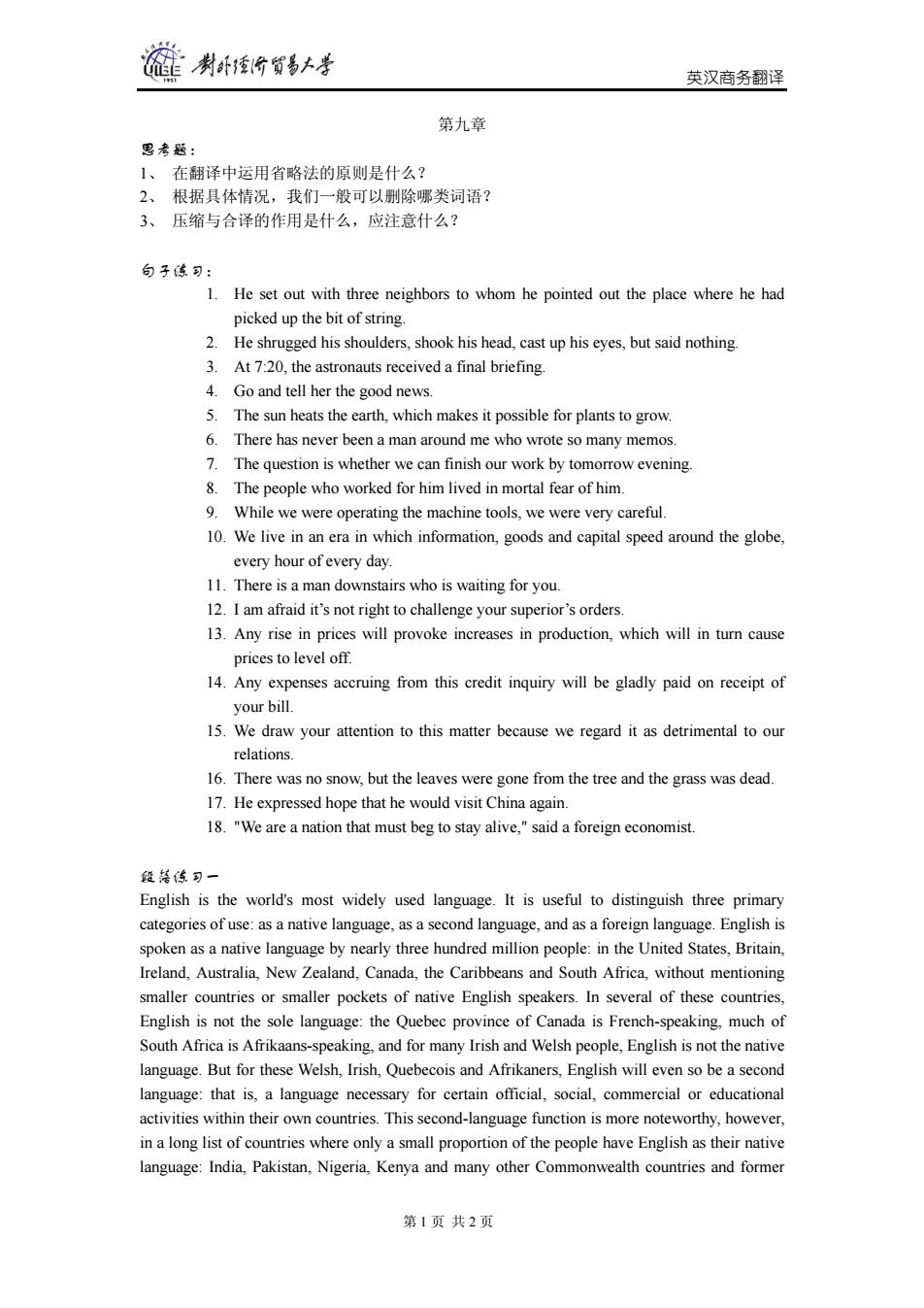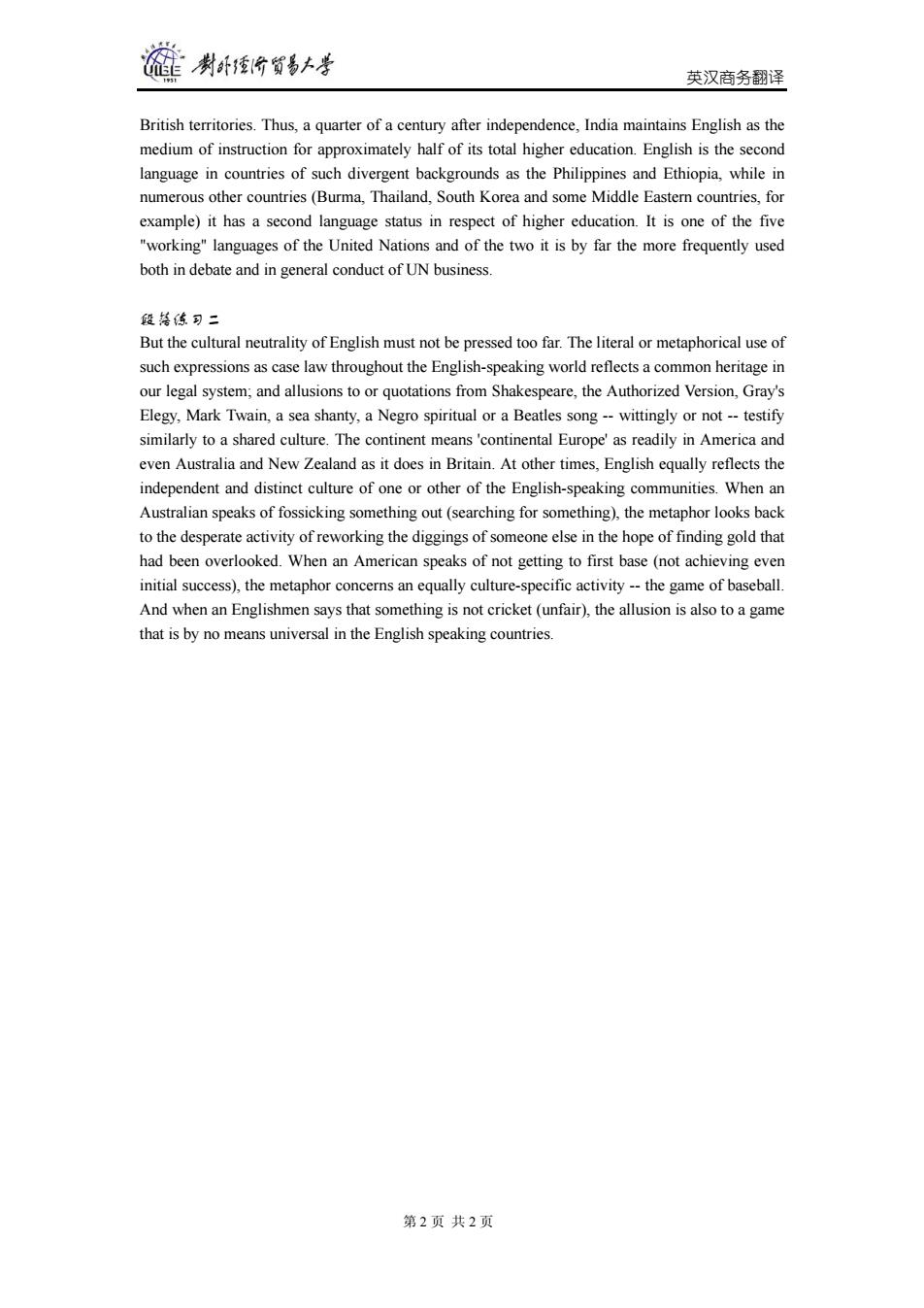
溢 制卧爱分货易+学 英汉商务翻译 第九章 思考题: 1、在翻译中运用省略法的原则是什么? 2、根据具体情况,我们一般可以删除哪类词语? 3、压缩与合译的作用是什么,应注意什么? 句子缘习: 1.He set out with three neighbors to whom he pointed out the place where he had picked up the bit of string. 2.He shrugged his shoulders,shook his head,cast up his eyes,but said nothing. 3.At 7:20,the astronauts received a final briefing. 4.Go and tell her the good news. 5.The sun heats the earth,which makes it possible for plants to grow. 6. There has never been a man around me who wrote so many memos. 7.The question is whether we can finish our work by tomorrow evening. 8.The people who worked for him lived in mortal fear of him. 9.While we were operating the machine tools,we were very careful. 10.We live in an era in which information,goods and capital speed around the globe, every hour of every day. 11.There is a man downstairs who is waiting for you. 12.I am afraid it's not right to challenge your superior's orders. 13.Any rise in prices will provoke increases in production,which will in turn cause prices to level off. 14.Any expenses accruing from this credit inquiry will be gladly paid on receipt of your bill. 15.We draw your attention to this matter because we regard it as detrimental to our relations. 16.There was no snow,but the leaves were gone from the tree and the grass was dead. 17.He expressed hope that he would visit China again. 18."We are a nation that must beg to stay alive,"said a foreign economist. 段荟练习一 English is the world's most widely used language.It is useful to distinguish three primary categories of use:as a native language,as a second language,and as a foreign language.English is spoken as a native language by nearly three hundred million people:in the United States,Britain, Ireland,Australia,New Zealand,Canada,the Caribbeans and South Africa,without mentioning smaller countries or smaller pockets of native English speakers.In several of these countries, English is not the sole language:the Quebec province of Canada is French-speaking,much of South Africa is Afrikaans-speaking,and for many Irish and Welsh people,English is not the native language.But for these Welsh,Irish,Quebecois and Afrikaners,English will even so be a second language:that is,a language necessary for certain official,social,commercial or educational activities within their own countries.This second-language function is more noteworthy,however, in a long list of countries where only a small proportion of the people have English as their native language:India.Pakistan,Nigeria.Kenya and many other Commonwealth countries and former 第1页共2页
英汉商务翻译 第九章 思考题: 1、 在翻译中运用省略法的原则是什么? 2、 根据具体情况,我们一般可以删除哪类词语? 3、 压缩与合译的作用是什么,应注意什么? 句子练习: 1. He set out with three neighbors to whom he pointed out the place where he had picked up the bit of string. 2. He shrugged his shoulders, shook his head, cast up his eyes, but said nothing. 3. At 7:20, the astronauts received a final briefing. 4. Go and tell her the good news. 5. The sun heats the earth, which makes it possible for plants to grow. 6. There has never been a man around me who wrote so many memos. 7. The question is whether we can finish our work by tomorrow evening. 8. The people who worked for him lived in mortal fear of him. 9. While we were operating the machine tools, we were very careful. 10. We live in an era in which information, goods and capital speed around the globe, every hour of every day. 11. There is a man downstairs who is waiting for you. 12. I am afraid it’s not right to challenge your superior’s orders. 13. Any rise in prices will provoke increases in production, which will in turn cause prices to level off. 14. Any expenses accruing from this credit inquiry will be gladly paid on receipt of your bill. 15. We draw your attention to this matter because we regard it as detrimental to our relations. 16. There was no snow, but the leaves were gone from the tree and the grass was dead. 17. He expressed hope that he would visit China again. 18. "We are a nation that must beg to stay alive," said a foreign economist. 段落练习一 English is the world's most widely used language. It is useful to distinguish three primary categories of use: as a native language, as a second language, and as a foreign language. English is spoken as a native language by nearly three hundred million people: in the United States, Britain, Ireland, Australia, New Zealand, Canada, the Caribbeans and South Africa, without mentioning smaller countries or smaller pockets of native English speakers. In several of these countries, English is not the sole language: the Quebec province of Canada is French-speaking, much of South Africa is Afrikaans-speaking, and for many Irish and Welsh people, English is not the native language. But for these Welsh, Irish, Quebecois and Afrikaners, English will even so be a second language: that is, a language necessary for certain official, social, commercial or educational activities within their own countries. This second-language function is more noteworthy, however, in a long list of countries where only a small proportion of the people have English as their native language: India, Pakistan, Nigeria, Kenya and many other Commonwealth countries and former 第 1 页 共 2 页

莲 制卧台贸易上兰 英汉商务翻译 British territories.Thus,a quarter of a century after independence,India maintains English as the medium of instruction for approximately half of its total higher education.English is the second language in countries of such divergent backgrounds as the Philippines and Ethiopia,while in numerous other countries(Burma,Thailand,South Korea and some Middle Eastern countries,for example)it has a second language status in respect of higher education.It is one of the five "working"languages of the United Nations and of the two it is by far the more frequently used both in debate and in general conduct of UN business. 段塔练习二 But the cultural neutrality of English must not be pressed too far.The literal or metaphorical use of such expressions as case law throughout the English-speaking world reflects a common heritage in our legal system;and allusions to or quotations from Shakespeare,the Authorized Version,Gray's Elegy,Mark Twain,a sea shanty,a Negro spiritual or a Beatles song--wittingly or not--testify similarly to a shared culture.The continent means 'continental Europe'as readily in America and even Australia and New Zealand as it does in Britain.At other times,English equally reflects the independent and distinct culture of one or other of the English-speaking communities.When an Australian speaks of fossicking something out(searching for something),the metaphor looks back to the desperate activity of reworking the diggings of someone else in the hope of finding gold that had been overlooked.When an American speaks of not getting to first base(not achieving even initial success),the metaphor concerns an equally culture-specific activity--the game of baseball. And when an Englishmen says that something is not cricket(unfair),the allusion is also to a game that is by no means universal in the English speaking countries. 第2页共2页
英汉商务翻译 British territories. Thus, a quarter of a century after independence, India maintains English as the medium of instruction for approximately half of its total higher education. English is the second language in countries of such divergent backgrounds as the Philippines and Ethiopia, while in numerous other countries (Burma, Thailand, South Korea and some Middle Eastern countries, for example) it has a second language status in respect of higher education. It is one of the five "working" languages of the United Nations and of the two it is by far the more frequently used both in debate and in general conduct of UN business. 段落练习二 But the cultural neutrality of English must not be pressed too far. The literal or metaphorical use of such expressions as case law throughout the English-speaking world reflects a common heritage in our legal system; and allusions to or quotations from Shakespeare, the Authorized Version, Gray's Elegy, Mark Twain, a sea shanty, a Negro spiritual or a Beatles song -- wittingly or not -- testify similarly to a shared culture. The continent means 'continental Europe' as readily in America and even Australia and New Zealand as it does in Britain. At other times, English equally reflects the independent and distinct culture of one or other of the English-speaking communities. When an Australian speaks of fossicking something out (searching for something), the metaphor looks back to the desperate activity of reworking the diggings of someone else in the hope of finding gold that had been overlooked. When an American speaks of not getting to first base (not achieving even initial success), the metaphor concerns an equally culture-specific activity -- the game of baseball. And when an Englishmen says that something is not cricket (unfair), the allusion is also to a game that is by no means universal in the English speaking countries. 第 2 页 共 2 页